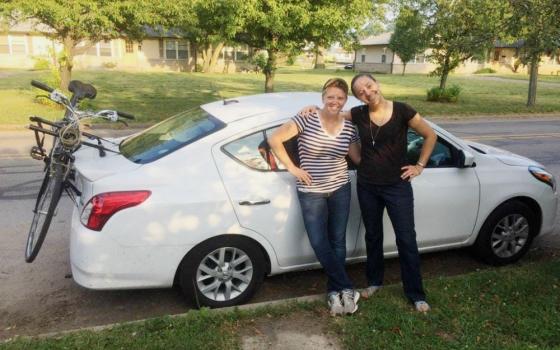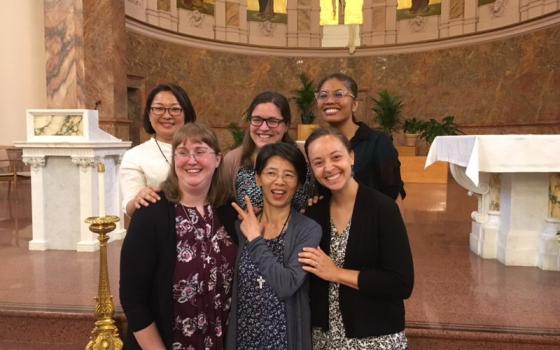One thing I love about apostolic life is the opportunity to pare down my belongings that comes with moving every few years. There is something cleansing about going through papers and recycling things, acknowledging I haven't worn a shirt for a year so it's time to let go, wondering why I've hung on to random gadgets that at some point I had sworn I might use someday. Well, someday never came for those sunglasses with holographic images of the Blessed Mother in each lens.
And within the ritual are grappling with "want" versus "need," struggles with letting go and, this time around, the harsh reality that everything I would take with me across the country needed to fit in the back of a four-door subcompact car.
All of it brings me face-to-face with my commitment to live the vow of poverty, or openhandedness, as I often like to think of it. I've been reflecting on this vow quite a bit lately, a commitment I reaffirmed last month as I renewed my vows for three more years at our motherhouse alongside my "band member" Anna, the sister who joined the Sisters of Providence with me nearly five years ago.
Toward the beginning of my paring-down, this time in preparation to move out of the Catholic Worker House of the Little Flower in Indianapolis, I had a box of things to donate. On my way out the door, I realized Bella (not her real name), who had just moved in with us with few belongings to her name, might have a need for some of the things that had been sitting on my shelf for the last year. I found her downstairs and asked if she wanted to look through the things I was taking to Goodwill. She said yes, and I left the bags for her to peruse.
When I walked back through the common area, she got my attention and said if I knew of anyone in the house who was getting rid of clothes, she could use some.
My heart sank because I had just taken a bag of clothes to donate the day before and hadn't even thought about asking her. When I went back upstairs, I looked at my chest of drawers with new eyes. Surely, I could spare a few more shirts and a pair of pants or two. I was caught by an opening within myself when I knew there was a person downstairs who could use what I had. Suddenly, I could part with that T-shirt I was so nostalgic about but never wore, or those shorts I only put on every once in a while. I gathered up a pile of things and then let Bella know I'd put them on her bed to look through.
I went bustling through my day, running errands in preparation for my big move to Nogales, Arizona. When I came home later that evening, Bella was on her phone in the kitchen. She whirled around and smiled when I came in, and the sight caught me off-guard: She had cut a pair of capris I'd given her into shorts and had an old shirt of mine twisted and tied up in the back.
"My pants!" I thought. That word "my" burst into my consciousness with a raw truth I couldn't deny. What had she done? That was a perfectly good pair of capris!
In the span of 30 seconds, I moved through shock, then disappointment, then amusement at myself, reflecting on what had transpired. You gave them to her, remember? They're not yours anymore.
The whole scene revealed just how openhanded I'd been in giving those clothes away. Somewhere inside lived the conditions: If you wear them like this ... if you use them ... if you keep them nice ... The scene forced me to acknowledge that on some level, my fists were still clenched. The word "my" still rang in the background.
In the weeks that followed, I faced other moments that raised the question: Have I really let go?
As I process leaving behind a ministry I loved, although I believe in the people who carry it on and I know deeply this is the next right step for me, I can't help but worry how the projects I left unfinished will go. My brother Jesus reminds me, "No one who sets a hand to the plow and looks to what was left behind is fit for the kingdom of God" (Luke 9:62).
Sometimes I can't help but keep one hand on the plow.
The practice of letting go came into play again as I chatted with an acquaintance at a local parish last month. We were making conversation, and she brought up an unpleasant experience she'd had offering a donation to a man holding a sign on the street asking for money. He hadn't wanted the food she offered him. She was appalled and offended. Shouldn't he be happy with whatever he could get?
She went on to chronicle all the reasons she didn't give money to people she saw on the street anymore. She was convinced they always spent it on drugs or alcohol or that they weren't homeless at all and just wanted some extra cash.
The conversation brought to mind a story I've heard about Dorothy Day, co-founder of the Catholic Worker movement. The legend goes that the Catholic Worker received a donation of an expensive piece of jewelry. The community was excited about selling it and began imagining all the supplies they could buy for the house with that money.
In the meantime, Dorothy decided without consulting anyone to give it away to someone who came in off the street and needed money. Her companions were furious. "The person will probably just use it to buy drugs," they reasoned. But to her, there was a need, and she met it.
This is the hardest part of openhandedness for me: withholding judgment. I started a ritual a few years ago to practice this. Every month, I would reserve a certain bit of my personal budget in cash to give to people holding signs asking for money on the street. When it was gone for the month, it was gone. But I carried that money with intention: It was their money, not mine. When I saw someone asking for money, I would think, "Oh, there they are. I have their money to give to them."
Sometimes the openhandedness would feel genuine. Other times, I would feel the judgment and assumptions rising within me as I looked at their clothes, measuring just how "homeless" they looked. This is why I needed the practice.
As I get settled in a new ministry in a new town with a new set of people, there is a whole new set of opportunities to practice taking my hand off the plow — letting go of what isn't mine. There are moments I cling white-knuckled to the plow I knew. Then there are the moments someone else seems to have yanked the plow out of my hands. And still others when I forget there was ever a plow at all. With this new unfolding, there is hope for me in knowing that the Bellas and Dorothys of the world will keep showing me just how tight my fists are clenched, when I need a reminder.
[Tracey Horan is a member of the Sisters of Providence of St. Mary-of-the-Woods, Indiana. She is the education coordinator at the Kino Border Initiative in Nogales, Arizona, and Sonora, Mexico.]


